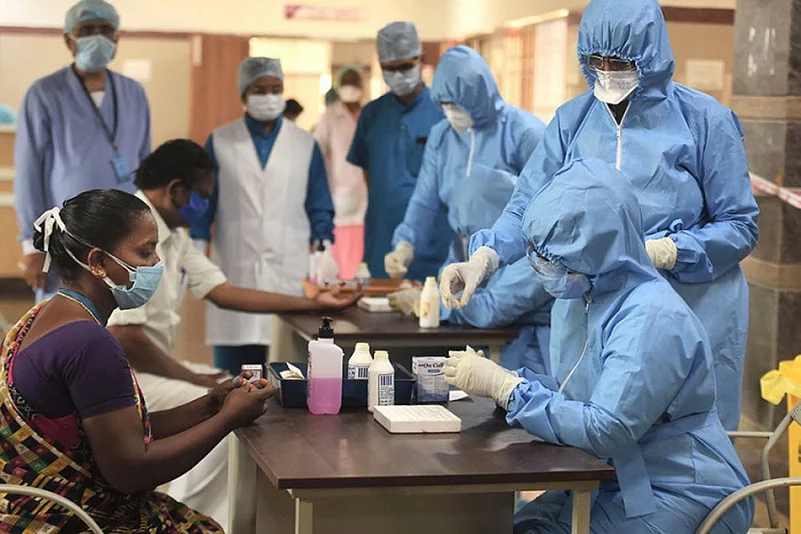From five to 500-plus in 30 days flat!
That’s how fast the Covid-19 graph has leap-frogged in Odisha. From a measly 5 on March 5, the number of positive cases surged to a staggering 588 on April 6 (Tuesday), making it abundantly clear that the dreaded "second wave" of the virus has well and truly arrived in the state.
Ironically, the massive spurt in new cases has come at a time when the government is in the process of ramping up facilities to ensure 2 lakh vaccinations a day.
Dr Jayant Panda, technical advisor to the state government on Covid-19, however, does not agree that there is a second wave in the state as yet. “Technically, you cannot say it is a second wave. The recent spurt in the number of positive cases can be attributed to the influx of people from the neighbouring states, mainly Chhattisgarh,” he tells Outlook.
Advertisement
So far, the state government’s response to the quantum jump in fresh positive cases has been limited to the imposition of a night curfew in 10 districts bordering Chhattisgarh and constant reminders to the people to continue observing the Covid protocol: wearing masks, maintaining social distance and personal hygiene. An off-the-cuff remark by the Speaker of the Assembly Surya Narayan Patro, of all people, on Sunday, that the state government was considering the imposition of "day curfew" in the next 4-5 days was promptly repudiated by the special relief commissioner’s office saying there was no such plan "at this stage".
The opinion is divided on whether the night curfew in 10 districts bordering Chhattisgarh, a high-incidence state, is serving any purpose. Senior doctor, Neeraj Mishra, for one, believes it doesn’t help much in containing the spread. “It’s during the daytime that we see crowding and congregation of people, which is a certain recipe for the spread of the virus. There is hardly any gathering during night. So, I don’t really see how we gain by imposing night curfew,” he says. But Dr Jayant Panda doesn’t agree. “Much of the movement of people, which helps spread the virus, takes place at night. So, it is not correct to say night curfew doesn’t help,” he opines.
Advertisement
Even if one accepts the wisdom of night curfew, it still doesn’t explain how Khurda, which accounted for as many as 105 of the 588 cases today, is not in the list of districts where night curfew has been imposed. And it is not as if it was a one-off instance on Tuesday. Khurda has consistently been among the top two or three districts ever since the number of cases started moving northwards. Alarmed at the sudden rise in the number of cases, the Puri district administration on Tuesday made RT-PCR negative report not older than 72 hours mandatory for anyone coming to the pilgrim town from the five high prevalence states of Madhya Pradesh, Chhattisgarh, Maharashtra, Punjab and Kerala.
While opinion is divided on the issue of night curfew, there is complete unanimity among the medical fraternity and the state government about the fact that voluntary observance of the safety protocols by the people is the only way to check the spread of the disease. In fact, the sudden rise in the number of positive cases can be attributed almost entirely to people lowering their guards and not taking necessary precautions as the Covid graph plummeted.
Asked if he sees the graph going further up in the days ahead, Dr Jayant Panda says; “When fresh cases are rising all around us, we cannot possibly remain immune to it. After all, we are part of India, aren’t we?” he says. As he sees it, the number of new positive cases would continue to rise before tapering off around the last week of April, but "only if the people take things seriously".
Advertisement
Are we ready to fight a second wave as and when it comes? “Of course, we are. We have in abundance everything we need – trained medical staff, hospital beds, ICUs, ventilators, PPEs – and most importantly, the experience of fighting Covid for the last year. We have managed things efficiently when the situation was much worse – and that too at a time when we did not know all about the virus. So, there is no reason why we can’t fight a fresh surge,” he signs off.




















